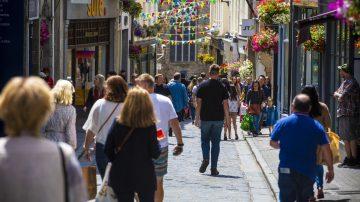Guernsey’s Asian hornet team has recently launched its ‘Spring Queening’ phase for its third year running in time to catch any remaining queen hornets emerging from hibernation, or those travelling on favourable winds to our islands from France.
The team works to deliver the aims of the Asian Hornet Strategy to ensure that we keep the population of Asian hornets as low as possible, a strategy which has so far enjoyed success. It is hoped that with Islander’s continued cooperation, we will have another year of successful management of this invasive threat to our native insect populations.
Each year the Channel Islands are subject to an invasion of Asian hornets from France that are looking to expand their territory and establish new populations. Queen hornets live in isolation for a few weeks in spring which makes them easier to capture because they have to forage for food. Trapping these queen hornets is the main priority to prevent them raising the next generation of worker hornets which would otherwise go on to build huge nests.
Without a coordinated control programme, that Asian hornets would certainly become very quickly established. If this were to happen it would then be virtually impossible to eradicate them.
The Asian Hornet Strategy places emphasis on capturing queen hornets each spring (“Spring Queening”), as dealing with a hornet queen and her small nest is much more effective and simplistic than tackling the very large secondary nests that are invariably built high up in the treetops. If they are not treated and removed, these secondary nests expand rapidly during August-September and can hold up to 5,000 hornets.
When undetected or left uncontrolled, Asian hornets may present an increased risk to the public as well as causing significant harm to our native insect populations as they are a voracious predator. The latest research from France estimates that a full-size hornet colony can consume as many as 11kg of helpful pollinating insects in one summer.
Throughout March, the Asian hornet Team have been contacting landowners and householders across the island asking them to take part in the “Spring Queening” programme. In total, 270 specially modified traps have been set up in gardens, hedges and fields as part of the comprehensive island-wide programme to trap queen Asian hornets which have recently emerged from hibernation. Each volunteer received a trapping kit with full instructions on how to set up the trap and what to do if they catch an Asian hornet. The same systematic method of trapping is being rolled out across Alderney, Herm and Sark to trap these invading non native pests and prevent their establishment.
Francis Russell – Project Coordinator (Asian Hornet Strategy) said: “The first confirmed sighting of an Asian hornet on Sark for 2021 is a timely reminder for Islanders to remain vigilant and report any potential sightings swiftly so that we can check these out.
“Every year we have noticed that queen hornets have a habit of turning up in kitchens so it is important to not let these insects escape if you do suspect it could be a hornet. Most likely, it will be a harmless queen wasp, but it is always a possibility.
“I would also ask people to check their outbuildings, sheds, verandas and porches to look for any of the early queen’s nests – pale brown and not much bigger than a golf ball”.
If you think you have discovered an Asian hornet, try to safely contain it so it cannot escape outside, take a photograph and email it to asianhornet@gov.gg for confirmation, or call 07839 197082. For more information click here.
















